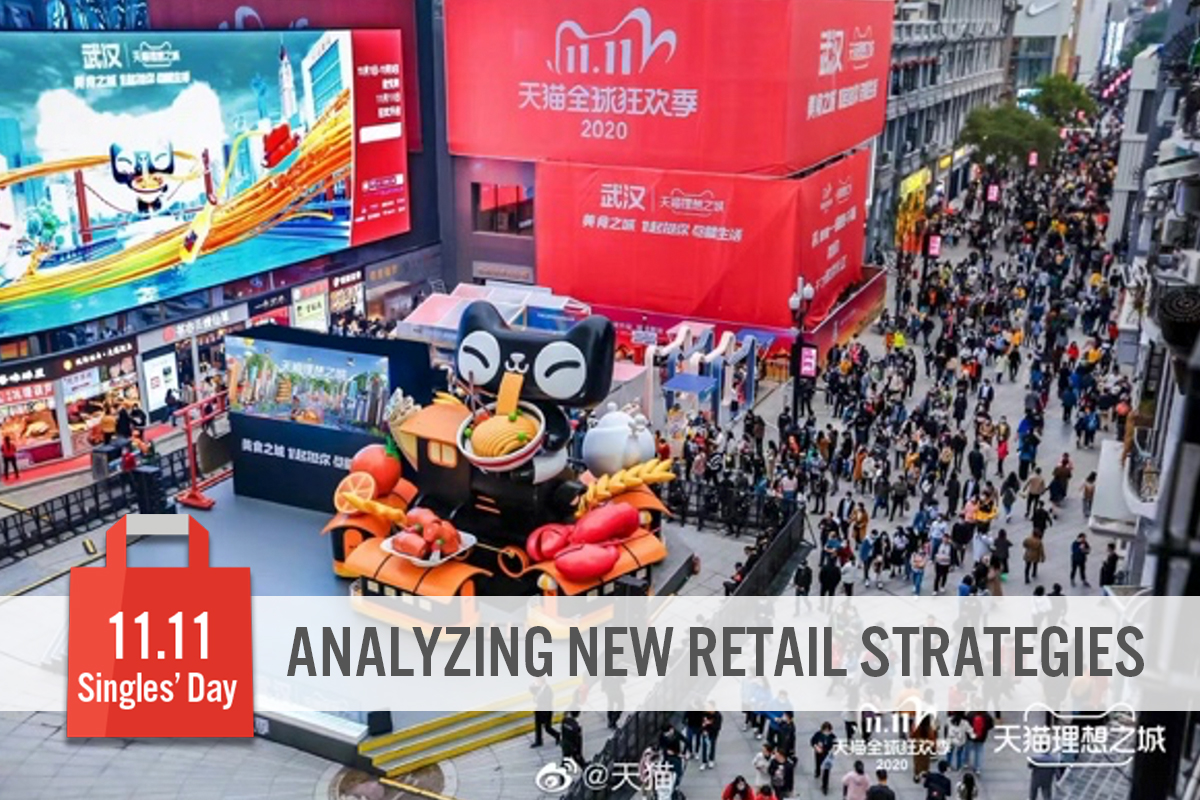
Nitheesh NH
What’s the Story?
“New Retail” is a model for integrating online retail, offline retail and logistics across a single value chain powered by data and technology. Started as an online-only shopping festival, Double 11 has been shifting toward an omnichannel presence to extend the shopping spree to offline. We explore the New Retail strategies employed by brands and Alibaba’s Tmall e-commerce platform during Singles’ Day 2020.Why It Matters
Brick-and-mortar stores were hit hard by the Covid-19 pandemic in the first quarter of 2020, causing many to make efforts to accelerate their digital transformation. As China recovers strongly from the pandemic and stores reopen, consumers are returning to offline store shopping. According to a Singles’ Day survey by AlixPartners, 60% of Chinese consumers expected to visit brick-and-mortar stores for bargains this year, and 40% expected to collect discount coupons online to use in stores.New Retail Strategies: In Detail
1. Offline Experiential Events As the pandemic is brought under control in China, pop-up stores and offline experiential events are regaining their popularity. These temporary shops are more cost-effective and flexible for brands than other physical formats due to their shorter setup time, smaller space and limited operational period. Such locations also present key marketing opportunities, as they offer a fun and engaging way to connect with experience-driven young consumers, and visitors often share pictures and experiences on social media, which generates buzz. We saw a number of consumer-goods brands launch pop-ups for Singles’ Day 2020, including Midea and Panasonic:- To promote its new steam oven for Singles’ Day, Chinese home-appliance brand Midea collaborated with fitness app Keep to open a pop-up format in Shanghai. As Chinese consumers are more aware of their health, Midea emphasizes that the technology in its steam oven can reduce the fat content and sodium in food, so customers can consume food in a healthier way with fewer calories. During the pop-up event, visitors could interact with fitness trainers from Keep to learn more about the product. Midea also launched a campaign on the Keep digital app, the “14-day fat burning challenge,” through which participants had the chance to win a steam oven.
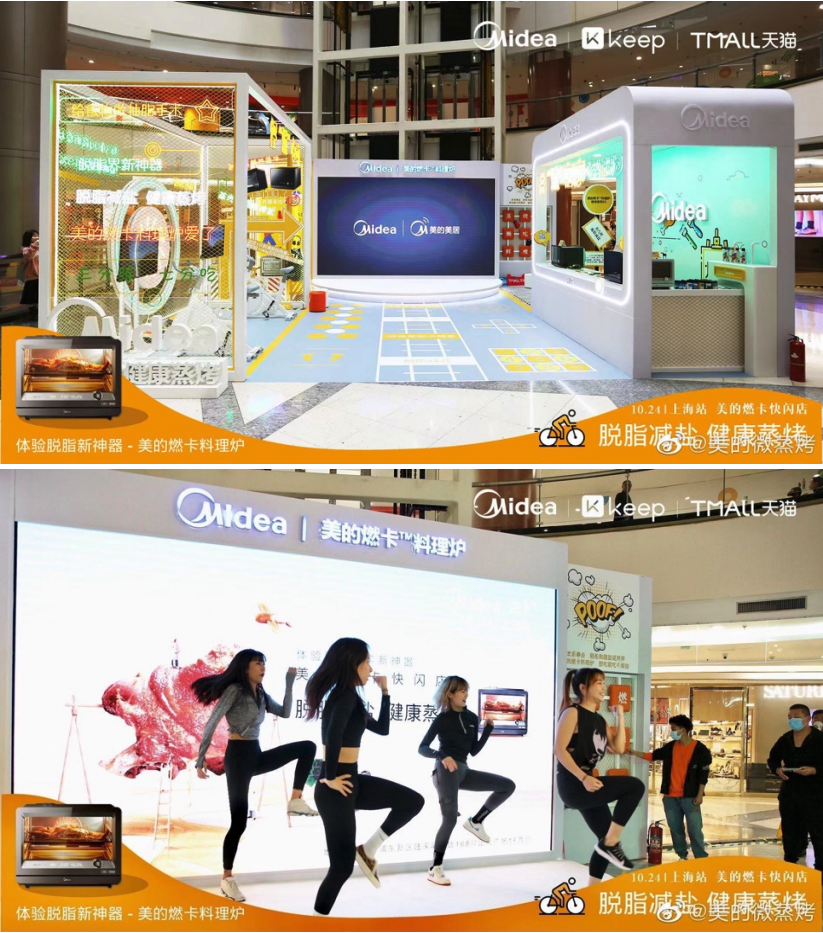 Source: Midea[/caption]
Source: Midea[/caption]
- Panasonic opened two pop-ups in Guangzhou’s Parc Central shopping mall for Double 11. One, called Barber Shop, centered around men’s grooming and showcased the brand’s new hair clippers. The other pop-up promoted Panasonic’s high-end “X series” blow dryers and beauty devices. Consumers could book an appointment online to try these devices in-store and play the claw machine to win discount coupons.
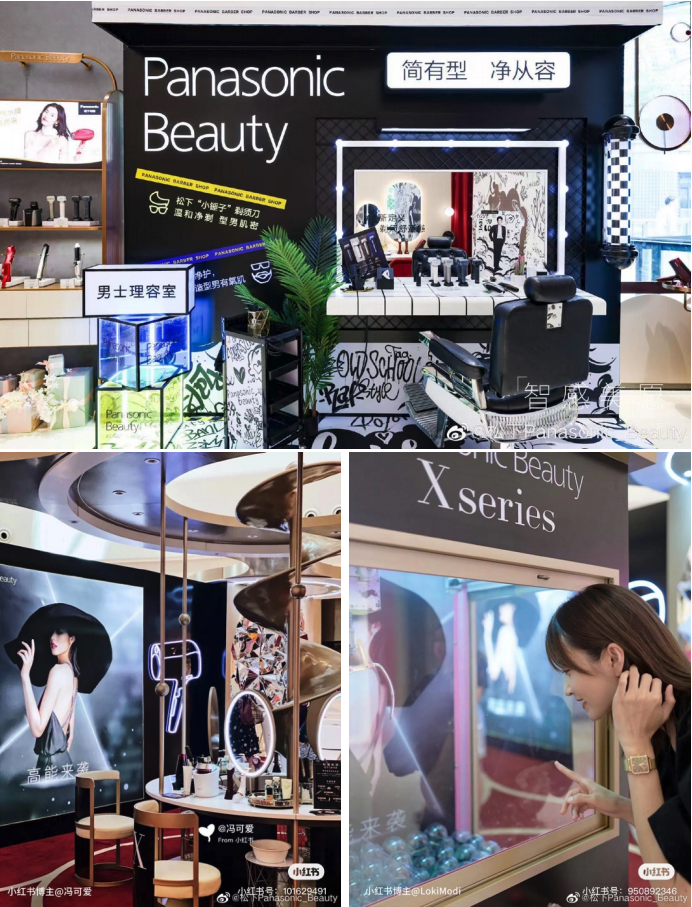 Source: Panasonic Beauty[/caption]
Tmall also launched offline events for Singles’ Day for the second consecutive year: Tmall Ideal City events were held in eight high-tier cities in China. Tmall partnered with local governments, brands and merchants to host various activities during November 1–11, with the goal of attracting young consumers and helping brands to increase their exposure.
Each event had a different theme, based on consumer data from each city. The event in Shanghai focused on beauty and personal care, with consumers able to try out bestselling and new beauty products. Beijing’s activities centered around winter sports, as it will host the Winter Olympics in 2022. Many programs were lined up, including interactive games, livestream sessions, fan-meets with young idols and more. Shenzhen, the home of many big tech companies, showcased some of the latest technology and electronics, such as transparent TVs and smart home devices from brands including BOSE, Dyson and Intel.
All the events aimed to deliver an explorative and immersive experience; visitors could not make purchases through the offline format, but they could scan QR codes displayed next to the products to buy online through Tmall. Consumers from other cities could also participate in Tmall Ideal City online games to win gifts.
[caption id="attachment_119625" align="aligncenter" width="700"]
Source: Panasonic Beauty[/caption]
Tmall also launched offline events for Singles’ Day for the second consecutive year: Tmall Ideal City events were held in eight high-tier cities in China. Tmall partnered with local governments, brands and merchants to host various activities during November 1–11, with the goal of attracting young consumers and helping brands to increase their exposure.
Each event had a different theme, based on consumer data from each city. The event in Shanghai focused on beauty and personal care, with consumers able to try out bestselling and new beauty products. Beijing’s activities centered around winter sports, as it will host the Winter Olympics in 2022. Many programs were lined up, including interactive games, livestream sessions, fan-meets with young idols and more. Shenzhen, the home of many big tech companies, showcased some of the latest technology and electronics, such as transparent TVs and smart home devices from brands including BOSE, Dyson and Intel.
All the events aimed to deliver an explorative and immersive experience; visitors could not make purchases through the offline format, but they could scan QR codes displayed next to the products to buy online through Tmall. Consumers from other cities could also participate in Tmall Ideal City online games to win gifts.
[caption id="attachment_119625" align="aligncenter" width="700"] Tmall Ideal City in Beijing (left) and in ShenZhen (right)
Tmall Ideal City in Beijing (left) and in ShenZhen (right)Source: Tmall[/caption] [caption id="attachment_119626" align="aligncenter" width="700"]
 Tmall Ideal City in Suzhou (left) and in Wuhan (right)
Tmall Ideal City in Suzhou (left) and in Wuhan (right)Source: Tmall[/caption] 2. 3D Virtual Showrooms To improve the consumer shopping experience for home-furnishing products, Tmall leveraged AR and VR to create a virtual mall, Tmall 3D Mall, that contains hundreds of showrooms by home-appliance and furniture brands. This feature offered an immersive and interactive e-commerce experience that replicates in-store furniture shopping. Consumers could browse different showrooms based on themes, styles, brands and house size. They could also mix and match products and play around with different colors and patterns, all on their mobile. Using location-based services, the nearest stores would be shown to shoppers, and they could also choose to try the products in-store and then purchase online. According to Tmall, over 100,000 users experimented in the Tmall 3D Mall showroom on November 1 (the first day of the first round of Double 11 sales). In the first hour of November 1, furniture brands including KUKA, Linshimuye, QuanU and Sleemon achieved GMV of over ¥100 million ($14.7 million) on Tmall. In selected offline stores, several furniture brands also partnered with Tmall to offer special promotions, such as 50% discounts on selected products and ¥9.90 (around $1.50) flash sales. [caption id="attachment_119627" align="aligncenter" width="700"]
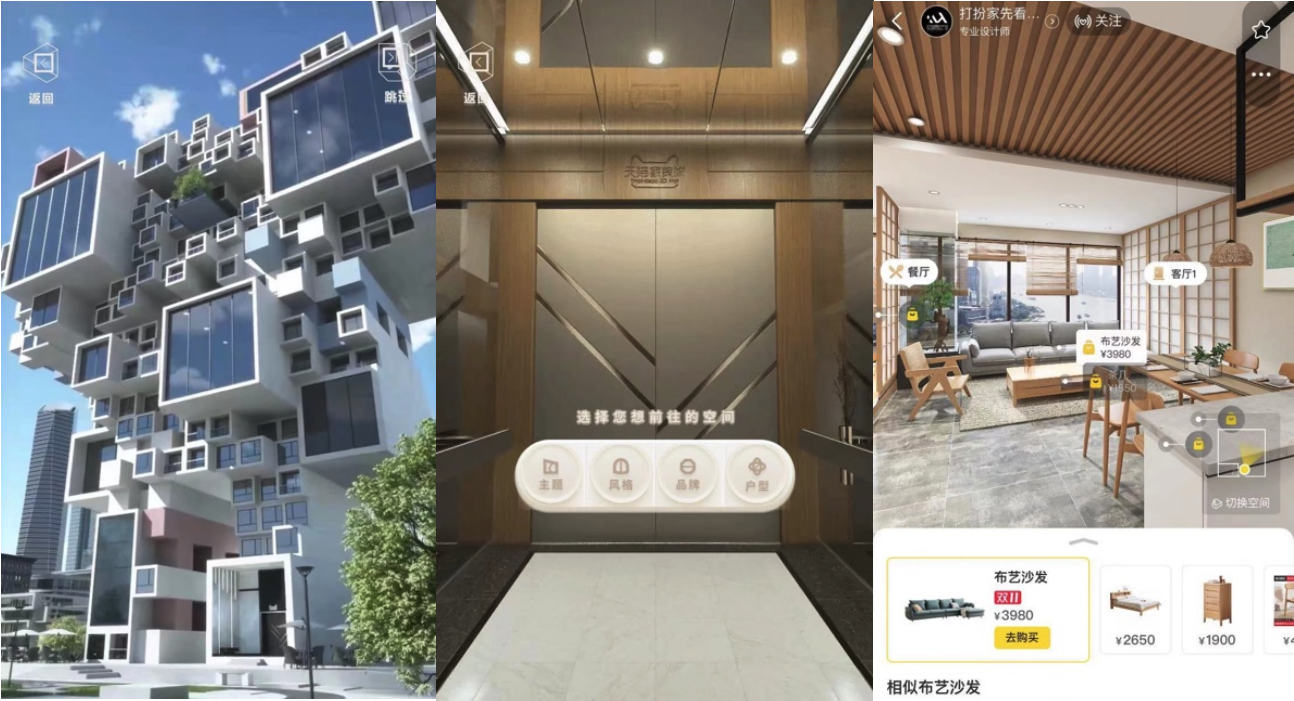 Source: Tmall[/caption]
3. Online Coupons
For the first time, Alibaba’s mobile payment platform Alipay participated in Double 11 this year. Alipay has evolved into a one-stop digital lifestyle app that offers a wide range of lifestyle services for its 1.2 billion users, such as food delivery, clothing dry cleaning and more. To help local businesses, Alipay worked with nearly 2 million local service providers in over 100 cities in China to issue digital coupons that could only be redeemed in stores. Alibaba’s entire ecosystem was all in this time, including on-demand delivery platform Ele.me, travel service Fliggy, movie-ticket site Taopiaopiao and entertainment booking site Damai.
According to Alipay, KFC, McDonald’s, Starbucks and Chinese fast-food chain Wallace each saw sales of more than ¥100 million ($14.7 million) on the platform during November 1–3. In the same period, total redeemed coupons on Ele.me increased by 317% year over year.
As domestic tourism gradually recovers in China, many hotel groups also saw increasing consumer demand in travel bookings. On November 1–3, more than 600,000 hotel packages from five-star hotels such as Hyatt, Hilton and Marriott were sold on Fliggy. Marriott and Accor also surpassed transactions of ¥1 billion ($151 million).
[caption id="attachment_119628" align="aligncenter" width="580"]
Source: Tmall[/caption]
3. Online Coupons
For the first time, Alibaba’s mobile payment platform Alipay participated in Double 11 this year. Alipay has evolved into a one-stop digital lifestyle app that offers a wide range of lifestyle services for its 1.2 billion users, such as food delivery, clothing dry cleaning and more. To help local businesses, Alipay worked with nearly 2 million local service providers in over 100 cities in China to issue digital coupons that could only be redeemed in stores. Alibaba’s entire ecosystem was all in this time, including on-demand delivery platform Ele.me, travel service Fliggy, movie-ticket site Taopiaopiao and entertainment booking site Damai.
According to Alipay, KFC, McDonald’s, Starbucks and Chinese fast-food chain Wallace each saw sales of more than ¥100 million ($14.7 million) on the platform during November 1–3. In the same period, total redeemed coupons on Ele.me increased by 317% year over year.
As domestic tourism gradually recovers in China, many hotel groups also saw increasing consumer demand in travel bookings. On November 1–3, more than 600,000 hotel packages from five-star hotels such as Hyatt, Hilton and Marriott were sold on Fliggy. Marriott and Accor also surpassed transactions of ¥1 billion ($151 million).
[caption id="attachment_119628" align="aligncenter" width="580"]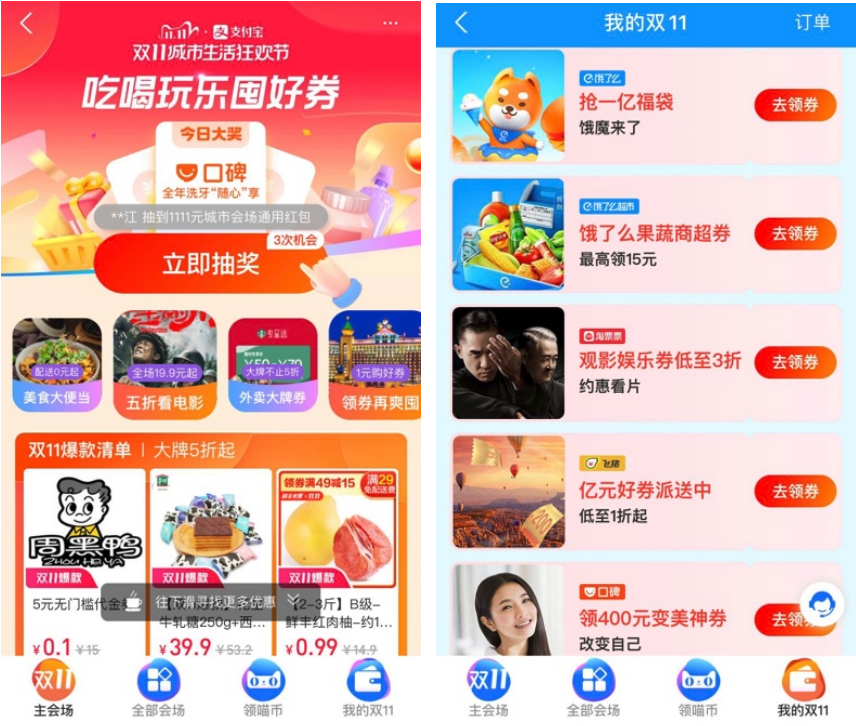 Source: Alipay[/caption]
Source: Alipay[/caption]
What We Think
This year’s 11.11 featured a massive New Retail initiative, as many brick-and-mortar stores have been accelerating their omnichannel approach to better connect with consumers. Implications for Brands/Retailers- Pop-up stores and offline events regained their popularity as the pandemic was brought under control in China. Brands and retailers can host interactive events to showcase new products and offer a personalized experience to consumers. During shopping festivals, they can also partner with e-commerce platforms such as Tmall to hold offline events that maximize brand exposure.
- 3D technology provides consumers with an immersive retail experience that replicates in-store shopping. This works particularly well for furniture brands, allowing consumers to virtually see how the furniture would fit in the home.
- Alipay serves 1.2 billion users with a variety of lifestyle services. In addition to issuing coupons via Alipay to direct traffic to stores, grocery retailers or even fashion or beauty brands can consider working with Ele.me for on-demand delivery fulfilled from stores to meet consumer demand for convenience.
- More than ever, e-commerce presents a major opportunity in China. While the coronavirus crisis has accelerated structural shifts to e-commerce, it is also redirecting shopping that would have taken place on overseas trips by Chinese travelers to domestic purchases. We expect this to boost domestic online demand for fragrances and beauty, clothing, footwear and accessories, health supplements and vitamins, electronics, alcoholic drinks, and jewelry and watches—highly popular categories for overseas shopping.
- Such are the tailwinds that we expect e-commerce to account for more than one-quarter of China’s retail sales for the first time in 2020: In a $5 trillion total retail market, we expect e-commerce to account for around $1.35 trillion of purchases.
- As we recently discussed in detail, this shift to e-commerce will support the consolidation of a still-fragmented Chinese retail market, driving structural changes that go beyond channel shifts. Brands and retailers should stand ready to take advantage of these opportunities, including by adopting new retail strategies to offer a seamless and omnichannel shopping experience.